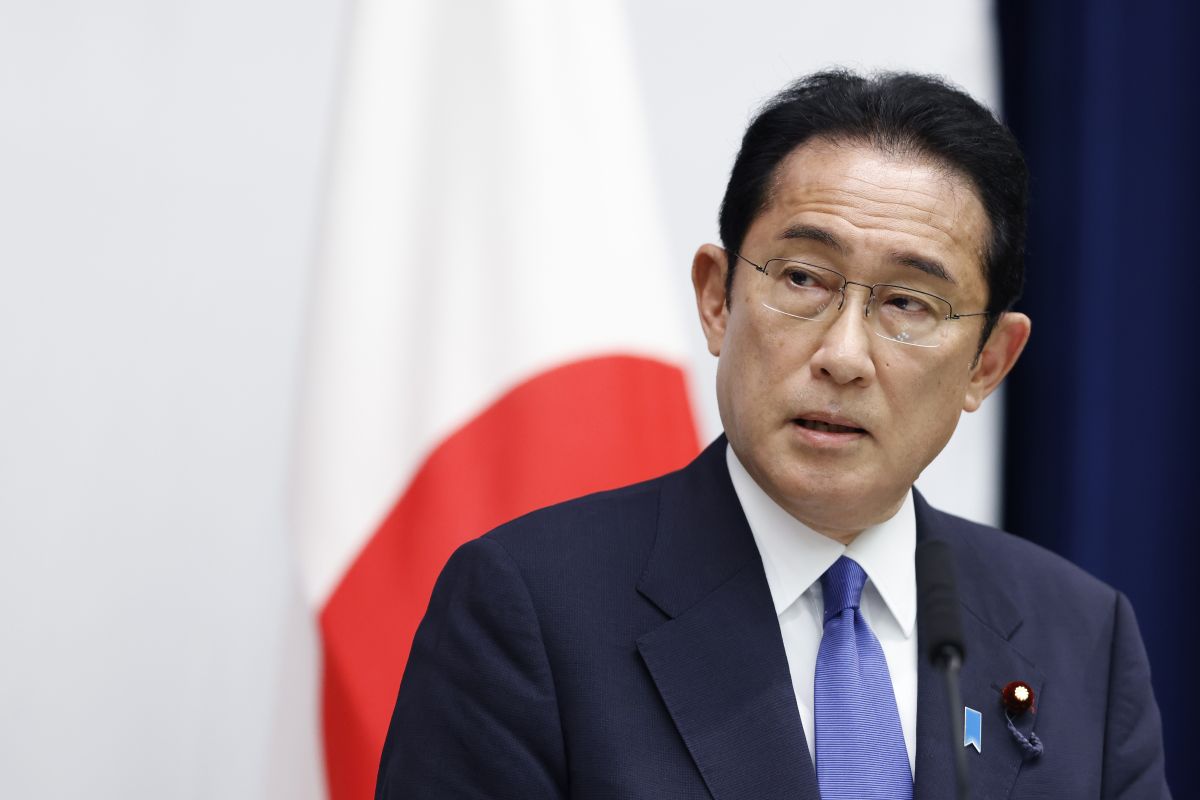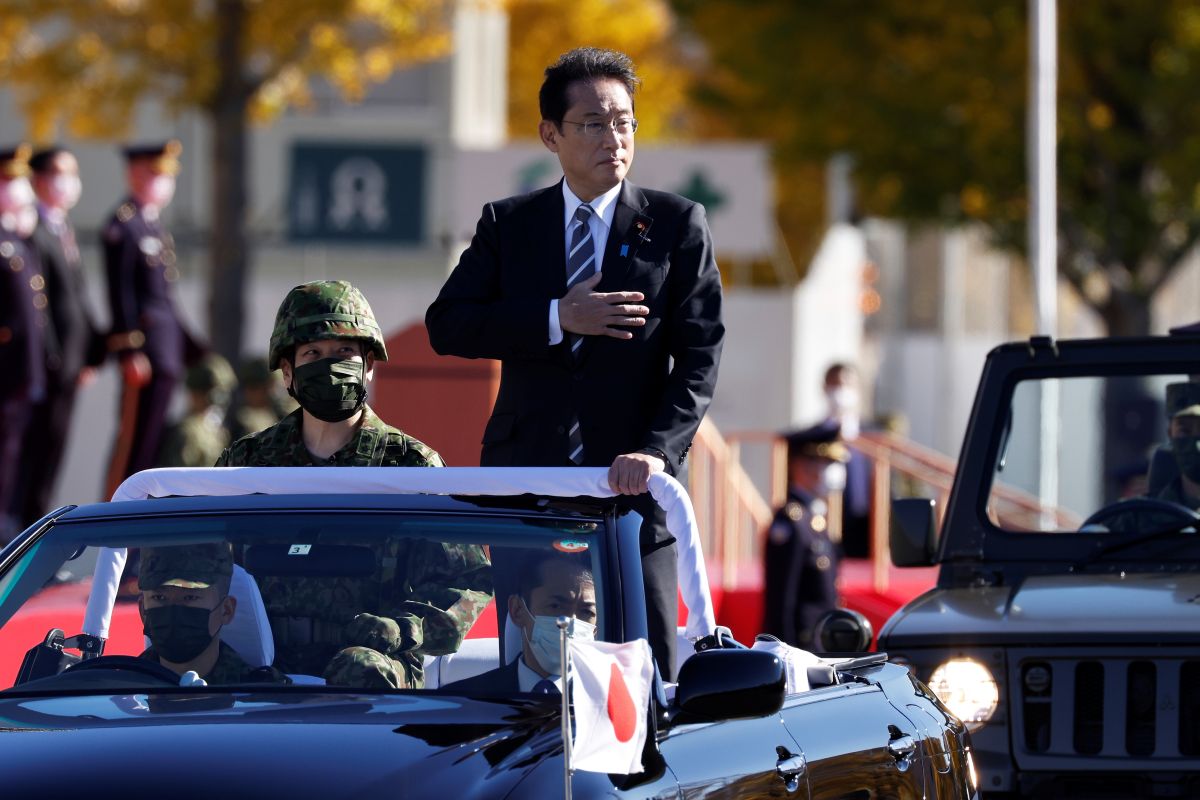Japan Focuses Policy on Economic Security
Japan is stepping up efforts to increase its economic security. In August, some new regulations came into force aimed at strengthening, among others, the resilience of supply chains and developing technological potential. Japan is thus responding to the challenges of China’s policy, the U.S.-China rivalry, and global technological progress. Improving economic security will require the government to cooperate with both Japanese business and international partners, including the U.S. and the EU.
 POOL/Zuma Press/Forum
POOL/Zuma Press/Forum
Conditions
The Japanese authorities’ interest in economic security issues has increased along with the rising costs of high economic interdependence with China. Since 2007, China has been Japan’s largest trading partner and an important location for Japanese investments, especially in the manufacturing sector. For years, China has been using economic ties for political purposes, an example of which was the suspension of exports of rare earth metals to Japan amid tensions around the Senkaku/Diaoyu islands in 2010. In the following years, China took similar actions against South Korea and Australia. Japan was also concerned about the purchase of real estate in strategic locations by Chinese entities (for example, near the Chitose Air Base on Hokkaido) and industrial espionage.
The increasing rivalry between the U.S. and China has also prompted Japan to increase its economic security. U.S. authorities urge allies, including Japan, to limit economic cooperation with China. In addition, the consequences of the COVID-19 pandemic, including disruptions to supply chains, have made Japan aware of the degree of its dependence on basic goods produced abroad, such as pharmaceuticals and semiconductors.
The growing awareness of the importance of economic security has also resulted from the development of technology and the competition between states to achieve a competitive advantage in this area. Cutting-edge technologies, such as artificial intelligence and big data, have been also increasingly used by other countries to achieve political goals. An example is China, which under what it calls “military-civil fusion” uses civil-sector technologies for military purposes. In addition, threats in cyberspace have been a problem for Japanese public institutions and businesses for years.
Regulatory Dimension
The foundations for Japan’s economic security policy were laid by the government of Abe Shinzo (2012-2020). The basis was adopting the National Security Strategy, pointing to the importance of economic competitiveness and technological development, and establishing the National Security Council and its Secretariat in 2013. In 2019, an economic security department was established in the Secretariat, and then similar units were gradually established in other institutions, such as the Ministry of Foreign Affairs. Abe also initiated a discussion in the ruling Liberal Democratic Party on legal solutions regarding this issue. In the first months of the COVID-19 pandemic in 2020, in response to supply chain disruptions, the Ministry of Economy, Trade and Industry (METI) created a $2.2 billion fund (an additional $2.1 billion was allocated in 2021) to encourage Japanese companies through loans and subsidies to move production facilities from China to Japan or Southeast Asian countries.
The government of Suga Yoshihide (2020-2021) presented the basic assumptions of the future law on economic security, and METI adopted a strategy assuming, among others, government subsidies for the domestic production of materials and equipment needed to create semiconductors. In addition, the parliament passed an act regulating the sale of land in the vicinity of places important to national security, including military bases, coast guard facilities, and nuclear power plants.
The efforts of his predecessors were continued by the government of Kishida Fumio, in power since October 2021. In the first weeks of his term of office, the prime minister created the position of minister of economic security and appointed an inter-ministerial Economic Security Council to prepare the first comprehensive legislation in this area. The bill was adopted by the Japanese parliament in May this year, and its first provisions entered into force in August (the whole law is to come into force within two years). It is based on four pillars. First, strengthening the resilience of supply chains to ensure a stable supply of critical materials, such as semiconductors. Second, increasing the security of critical infrastructure, in the context of cyberattacks, among others. Third, government financial support to develop cutting-edge technologies in cooperation with the private sector. Fourth, strengthening the protection of patents considered essential from the point of view of national security.
International Cooperation
Due to the complex nature of the challenges and threats to economic security, Japan is also developing international cooperation in this area. During Abe’s term, after China stopped exporting rare earths in 2010, the company Jogmec, managed by METI, initiated diversification of its suppliers by entering into partnerships with foreign companies, including ones in Australia, Kazakhstan, Malaysia, and Namibia. As a result, in 2010-2020, Japan’s dependence on imports of these raw materials from China decreased from over 90% to 58%. In response to China’s growing influence in the region, Japan has taken actions within the vision of a free and open Indo-Pacific. Japan has been involved in promoting free trade in the region through participation in the Comprehensive and Progressive Agreement for Trans-Pacific Partnership (CPTPP) and deepened political cooperation with countries sharing the principles of a liberal international order based on the rule of law, such as Australia and the U.S.
Japan and the U.S. pledged to deepen cooperation in the field of supply chains, research and development (R&D), and intellectual property protection as part of the “Global Partnership for a New Era”, concluded at the Biden-Suga summit in April 2021. In May this year, Japan joined the Indo-Pacific Economic Structure (IPEF) established by the United States, serving, among others, development of regional production networks. In July, both countries initiated a meeting in the “2+2” format on economic security with the participation of the heads of the ministries of foreign and economic affairs. Suga’s cabinet also cooperated with other partners of the Quad, establishing a collaborative initiative with Australia and India to improve supply chain resilience. In turn, the government of Kishida in November last year granted subsidies for the implementation of an estimated $7 billion investment by Taiwanese TSMC, a leader in the semiconductor market, which, in cooperation with Japanese Sony and Denso, is to build a chip manufacturing plant in Japan. In addition, in January this year the prime ministers of Japan and Australia announced cooperation in the field of supply chains, infrastructure, and R&D. Japan is also interested in cooperation with the European Union. During the EU-Japan summit in May this year, the parties identified economic security as an area of mutual interest and emphasised the need for in-depth consultations on China, including economic interdependence.
Conclusions and Perspectives
Japan’s economic security policy is in line with a global trend. In order to strengthen the economic and technological position and improve security, states introduce regulations aimed at securing supplies, developing technologies, and strengthening critical infrastructure. Besides Japan, similar solutions have been adopted by, among others, the U.S. and the EU.
The law on economic security confirms Japan’s shift, initiated under Abe, to strengthening the role of the state in the economy and persuading enterprises to take greater account of national security in their activities. The bill defines the framework for action, and detailed regulations will be adopted in the form of government and ministerial ordinances. Economic security issues are also to be part of the revised National Security Strategy, which is to be developed by the end of this year. Implementation of the regulations will require government cooperation with business, which indicates that the law is not transparent. Companies are concerned about the negative effects of regulation on their competitiveness, and that they may unknowingly violate the law or may not qualify for government subsidies.
A chance for the European Union may be trilateral cooperation with the U.S. and Japan, such as restricting technology transfer to China. Including Japan in the working groups of the Transatlantic Trade and Technology Council would enable the coordination of positions on issues such as investment screening and the establishment of lists of products essential for national security.
Comprehensive coverage of economic security in Japan’s state strategy may be an example for Poland. Including the issue of economic security in the agenda of intergovernmental Polish-Japanese consultations in a format similar to the U.S.-Japan “2+2” would serve to learn more about the Japanese approach.





_sm.jpg)